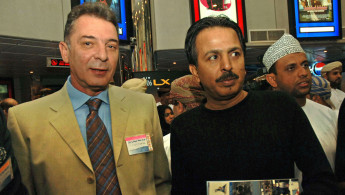Pioneering Omani actor passes away leaving sultanate's film-lovers mourning
Pioneering Omani actor passes away leaving sultanate's film-lovers mourning
When there was no film industry in his native Oman, Salim Bahwan moved abroad to study film-making and acting, returning home to promote cinema in the country.
2 min read
Bahwan (r) was a key figure in the nascent Omani film industry [AFP]
Salim Bahwan, a pioneer of Omani cinema, has died of a heart-attack in Muscat, marking the sad passing of one of the sultanate's first and best-known actors.
Bahwan was also a respected television and filmmaker, making some of Oman's first movies to tackle taboo subjects such as drug abuse and relationships.
Bahwan become an actor when the rest of Oman was still very much tuned out of television.
He said he was inspired by cinema after watching an Indian film as a seven-year-old in 1971.
"As I walked out of the theatre I made up my mind to become a film star," he told Times of Oman."Then I put in a lot of hard work to realise my dream."
Bahwan was also a respected television and filmmaker, making some of Oman's first movies to tackle taboo subjects such as drug abuse and relationships.
Bahwan become an actor when the rest of Oman was still very much tuned out of television.
He said he was inspired by cinema after watching an Indian film as a seven-year-old in 1971.
"As I walked out of the theatre I made up my mind to become a film star," he told Times of Oman."Then I put in a lot of hard work to realise my dream."
While other countries in the Gulf supped up Kuwaiti and Syrian dramas, television was still very much a recent innovation for Oman.
There was no television in the sultanate until the mid-1970s, and even now many households don't have sets at home.
With not even a nascent film industry in Oman to start with, Bahwan was forced to study abroad to pursue his dream.
In 1992, he got his break in television when he starred in the Kuwaiti TV drama, The Last Grape.
"It was the turning point in my career. I never looked back after it."
Bahwan began to star in some of Oman and the Gulf's best known television and film productions, making him a household name at home.
He even claimed to have turned down starring in a film with Hollywood actor George Clooney because of its negative portrayal of Arabs.
Bahwan later became the first Arab actor to star in an Indian film, when he starred in the Malayalam-language feature Uppappa.
"It is a dream come true for me as I always draw inspiration from Indian films. It is a challenging role," he told Times of Oman at the time.
Among the films he directed was Mahra Story, which was set in the Mussandam enclave, a rocky peninsular that is difficult to reach and where locals speak the Arabian Peninsula's only Persian dialect.
The film was a success and was screened at cinemas in Oman, showing the story of a ship's captain who meets a woman he is unable to marry due to her father's high dowry demand.
There was no television in the sultanate until the mid-1970s, and even now many households don't have sets at home.
With not even a nascent film industry in Oman to start with, Bahwan was forced to study abroad to pursue his dream.
In 1992, he got his break in television when he starred in the Kuwaiti TV drama, The Last Grape.
"It was the turning point in my career. I never looked back after it."
Bahwan began to star in some of Oman and the Gulf's best known television and film productions, making him a household name at home.
He even claimed to have turned down starring in a film with Hollywood actor George Clooney because of its negative portrayal of Arabs.
Bahwan later became the first Arab actor to star in an Indian film, when he starred in the Malayalam-language feature Uppappa.
"It is a dream come true for me as I always draw inspiration from Indian films. It is a challenging role," he told Times of Oman at the time.
Among the films he directed was Mahra Story, which was set in the Mussandam enclave, a rocky peninsular that is difficult to reach and where locals speak the Arabian Peninsula's only Persian dialect.
The film was a success and was screened at cinemas in Oman, showing the story of a ship's captain who meets a woman he is unable to marry due to her father's high dowry demand.
|
">
|



